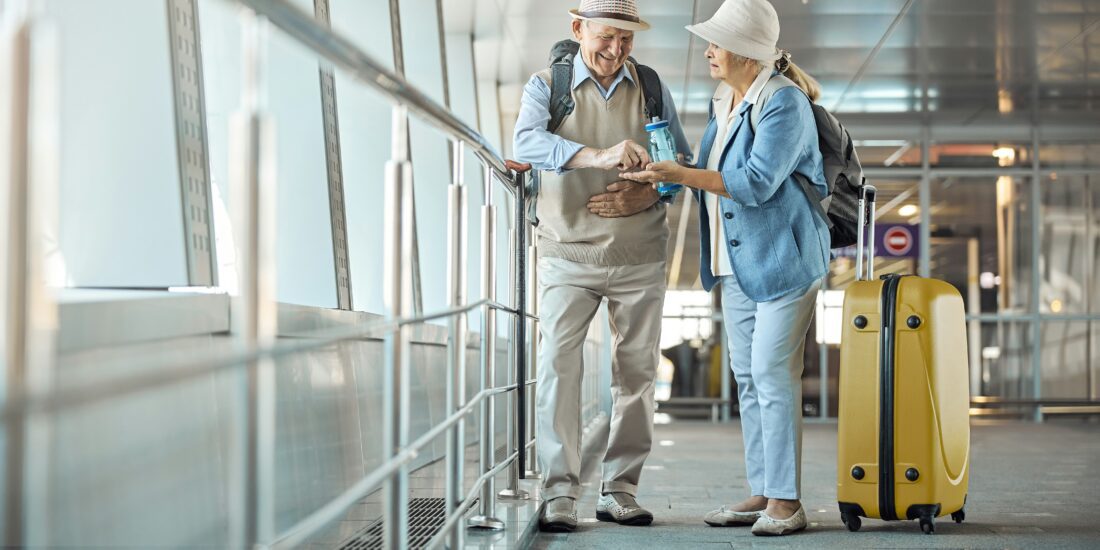The future calls for rethinking services for travellers with reduced mobility

October 29, 2025
Airports around the world are facing a growing number of travelers with mobility challenges. With a focus on inclusion and autonomy, Epinion helps airports meet passengers’ needs for an independent and comfortable journey
In recent years, there has been an increasing focus on diversity, equity and inclusion, which today ensures better opportunities than before in all parts of our society. This applies to all citizens with special life conditions – both physical and mental – as efforts are being made in both the public and private sectors to ensure equal opportunities across target groups.
In addition to those who have lived with reduced mobility from a young age, many people also experience mobility challenges as they age. Citizens over 65 are now the fastest-growing age group in Europe – a group that is both resourceful and eager to travel. These societal and demographic changes also mean that airports are facing a growing number of passengers who require special consideration. For airports, this trend can create challenges if not handled in a timely and appropriate manner. On the other hand, it offers opportunities – if managed wisely – by adapting services to resonate with an independent and travel-loving audience.
It is estimated that over 60 million passengers with reduced mobility travel by air globally every year. This development is already placing increased demands on operations and assistance – and these demands are expected to rise further in line with demographic trends.
Concrete measures that enhance the passenger experience
Among the most obvious improvements are better signage to ensure intuitive wayfinding for elevator users, improved accessibility in shops and restaurants, and greater comfort in airport wheelchairs. But when it comes to passengers with reduced mobility, Epinion’s research shows that independence, freedom of choice, and autonomy are key words for this group. Having the opportunity to move freely, explore shopping and dining options, and at the same time feel safe and independent of airport staff is crucial for their experience as well as their behaviour.
Standard solutions and either/or services are increasingly unable to meet these emotional and practical needs. As a result, more airports are rethinking the journey for passengers with reduced mobility by developing tailored solutions. These solutions not only support passengers when they need assistance but also give them the freedom to choose where and how they move through the airport.
Such solutions could, for example, include self-service alternatives to the traditional Passenger Assistance Service. Here, passengers with mobility challenges might use wheelchairs for all or part of their journey and travel accompanied by fellow travellers rather than by staff. Other solutions might enhance the shopping experience, either by transporting wheelchair users from waiting areas to shops, or by bringing the shops closer to passengers via online ordering and delivery to waiting areas.
The key lies in understanding their needs and behaviour
The journey through check-in, security, and boarding – and on the return journey through immigration and baggage claim – may appear similar from airport to airport. But the key to successfully adapting to new times lies in the details and requires deep insights into the composition and needs of each passenger group. Epinion has conducted extensive studies on needs and behaviours, which show that passengers with reduced mobility desire a safe, efficient, and pleasant travel experience, while their individual needs are respected. Further, concept evaluations confirm that special needs and autonomy can be reconciled, provided that one is initially deeply engaged in understanding the passengers’ behaviour and needs.
For airports working to adapt to the growing number of elderly and mobility-challenged travellers, it is essential to integrate in-depth insights and knowledge into their strategies. It is not just about meeting practical needs, but also about understanding and respecting the feelings and desires of passengers who value their autonomy. With the right efforts, these improvements can make a significant difference for a large number of passengers.
As demographic changes take hold, airports that manage to offer relevant alternatives to standard solutions will position themselves more strongly among the travellers of the future. Inclusion in the travel sector is not only desirable – it is necessary.
Want to know more?
Read our client case about how we worked with a major European airport on exactly this topic: https://epinionglobal.com/cases/major-european-airport/






